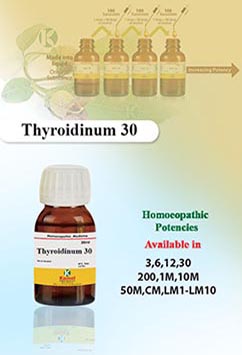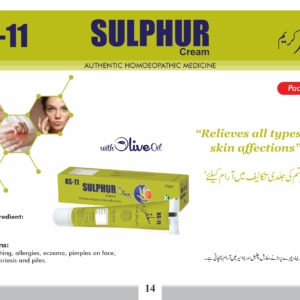Description
Indications / Symtoms : Thyroid produces anćmia, emaciation, muscular weakness, sweating, headache, nervous tremor of face and limbs, tingling sensations, paralysis. Heart rate increased, exophthalmus and dilation of pupils. In myxśdema and cretinism its effects are striking. Rheumatoid arthritis. Infantile wasting. Rickets.
Description : Delayed union of fractures. In half grain doses twice a day over a considerable period said to be effective in undescended testicle in boys. Thyroid exercises a general regulating influence over the mechanism of the organs of nutrition, growth and development. Thyroid weakness causes decided craving for large amount of sweets.
Of use in psoriasis; and tachycardia. Arrested development in children. Improves the memory. Goitre. Excessive obesity. Acts better with pale patients, rather than those of high color. Amblyopia. Mammary tumor. Uterine fibroid. Great weakness and hunger, yet loses flesh. Nocturnal enuresis. Agalactea. Begin treatment early in pregnancy. Dose 1 1/2 gr. 2 to 3 times daily. Vomiting of pregnancy (give early in morning before patient gets up). Fibroid tumors of the breast, 2x trit. Dilates arterioles (Adrenaline contacts them). Sensation of faintness and nausea. Marked sensitiveness to cold Hypothyroidism after acute diseases, i.e, weakness. Easy fatigue, weak pulse, tendency to fainting, palpitation, cold hands and feet, low blood pressure, chilliness and sensitive to cold (Thyroid 1×3 times daily). Has a powerful diuretic action in myxodema and various types of śdema.
Mind.–Stupor, alternating with restless melancholy. Irritable, worse least opposition; goes into a rage over trifles.
Head.–Feeling of lightness in brain. Persistent frontal headache. Eyeballs prominent. Face flushed; lips burn. Tongue thickly coated. Fullness and heat. Face flushed. Bad taste in mouth.
Heart.–Weak, frequent pulse, with inability to lie down. Tachycardia (Naja). Anxiety about chest, as if constricted. Palpitation from least exertion. Severe heart pain; Ready excitability of heart. Heart’s action weak, with numbness of fingers.
Eyes.–Progressive diminution of sight with central scotoma (Carbon sulf).
Throat.–Dry, congested, raw, burning; worse left side.
Stomach.–Desire for sweets and thirst for cold water. Nausea worse riding in car. Flatulence, much flatus in abdomen.
Urinary.–Increased flow; polyuria; some albumen and sugar. Enuresis in weakly children who are nervous and irritable (1/2 gr night and morning). Urine smells of violets, burning along urethra, increase of uric acid.
Extremities.–Rheumative arthritis with tendency to obesity, coldness and cramps of extremities. Peeling of skin of lower limbs. Cold extremities. Aching pains. Śdema of legs. Trembling of limbs and entire body.
Respiratory.–Dry, painful cough with scanty, difficult expectoration and burning in pharynx.
Skin.–Psoriasis associated with adiposity (not in developing stage). Skin dry, impoverished. Cold hands and feet. Eczema. Uterine fibroids. Browny swelling. Swelling of glands of stony hardness. Sluggish cases. Jaundice with pruritus. Ichtyosis, lupus. Itching without eruption, worse night.
Relationship.–Compare: Spongia; Calc; Fucus; Lycopus; Iodothyrine, (the active principle isolated from thyroid gland, a substance rich in Iodine and nitrogen, affects metabolism, reducing weight, may produce glycosuria. Use cautiously in obesity, for a fatty heart may not be able to maintain the accelerated rhythm. Milk contains the internal secretion of the thyroid). Thymus gland extract (arthritis deformans; metabolic osteoarthritis, 5-grain tablets 3 times daily). High potencies very efficient in exophthalmic goitre.
Dosage : Crude Thyroid at times; better sixth to thirtieth potency. If the crude Thyroid is taken (two to three grains or more daily); the pulse should be watched. Must not be given in physiological doses where with feeble heart there is high blood pressure a
Group : Homoeopathic Potencies
Strength : 3,6, 12, 30, 200, 1000, 10M, 50M, CM, LM (1-10)
Reference : HOMOEOPATHIC MATERIA MEDICA by William BOERICKE, M.D.







